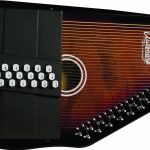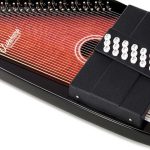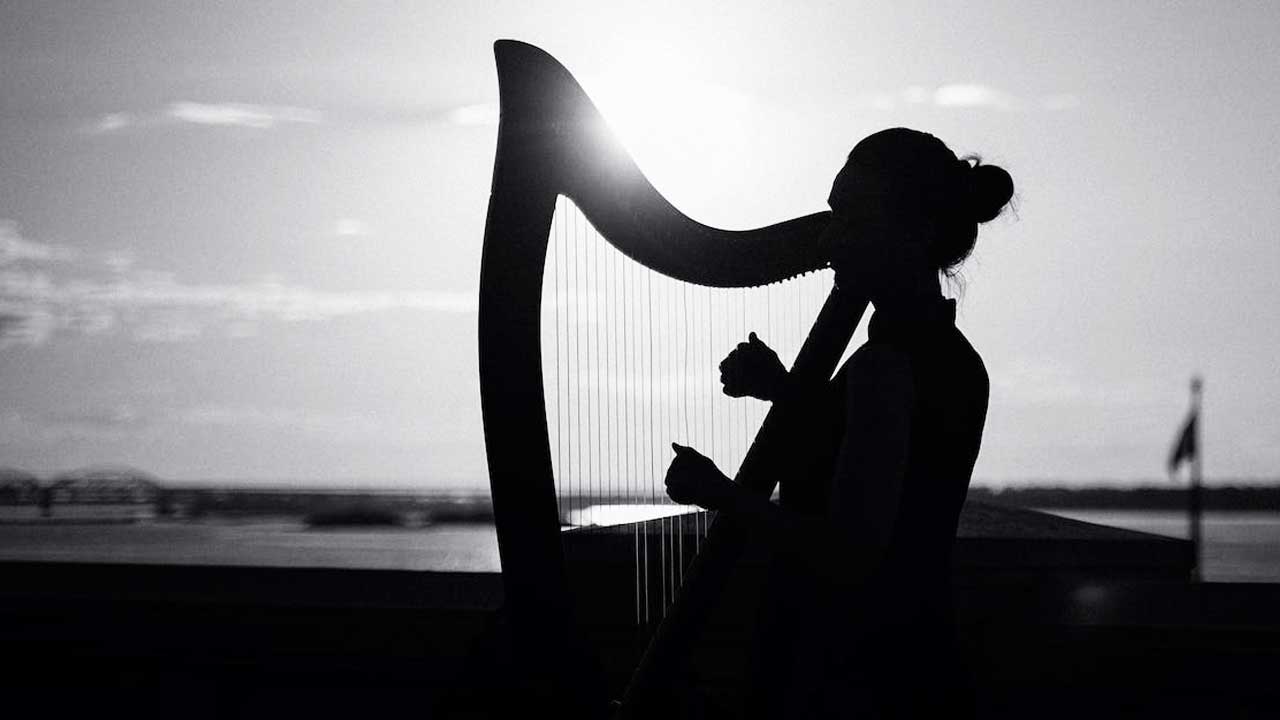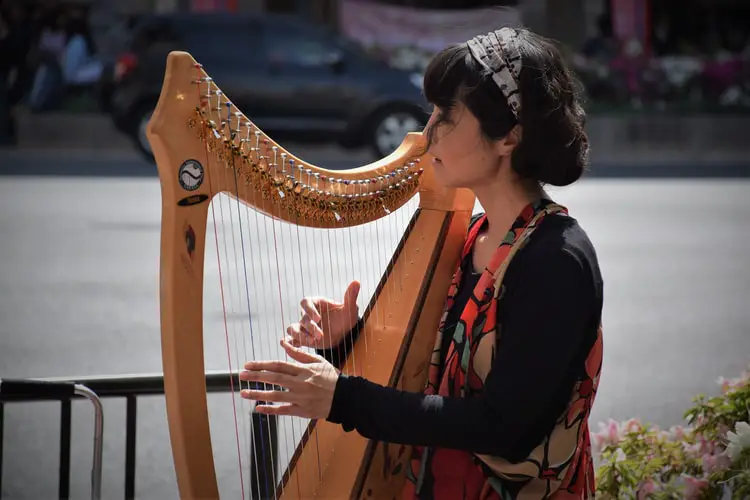How Hard Is It to Learn the Harp? Everything You Need to Know
Folkstrings.com is reader-supported. When you buy through links on our site, we may earn a small commission.
Learning to play a musical instrument can be a rewarding and enriching experience, but some instruments can seem more daunting than others.
The harp, with its beautiful and intricate design, may appear especially difficult to master. However, with dedication and practice, anyone can learn to play the harp.
In this article, we’ll explore the ins and outs of learning the harp, including the basics of playing, the challenges you may encounter along the way, and tips for making the learning process easier and more enjoyable.
Whether you’re a beginner or a seasoned musician looking to expand your repertoire, this article will provide valuable insight into the world of harp playing and help you determine if it’s the right instrument for you.
Table of Contents
Understanding the Harp
History of the Harp
The harp is one of the oldest musical instruments in the world, with a history that dates back to ancient Egypt. It was widely used in Europe during the Middle Ages and was a popular instrument in the courts of kings and queens. Over time, the harp has evolved into many different forms, from the small lap harp to the large concert harp. Today, the harp is still a popular instrument, and is often used in orchestras and ensembles.
Types of Harps
There are several different types of harps, each with its own unique characteristics. The most common types of harps include:
- Concert Harp: This is the largest and most recognizable type of harp. It has 47 strings and stands over 6 feet tall. Concert harps are typically used in orchestras and other large ensembles.
- Lever Harp: This is a smaller harp that is often used by beginners. It has levers on the strings that allow the player to change the pitch of each string. Lever harps are also known as Celtic harps.
- Pedal Harp: This is a type of concert harp that has pedals to change the pitch of each string. Pedal harps are more complex than lever harps, but they offer more control over the sound of the instrument.
- Folk Harp: This is a small harp that is often used in folk music. It is similar to a lever harp, but it has a more traditional design.
No matter what type of harp you choose, learning to play the harp can be a rewarding experience. With practice and dedication, you can learn to create beautiful music that will delight and inspire those around you.
Learning the Harp
Basic Techniques
Learning the basic techniques of playing the harp is essential for beginners. Start by learning how to hold the harp properly, with your left hand on top and your right hand on the bottom. Make sure your hands are relaxed and your fingers are curved over the strings. Practice plucking the strings with your fingers, and learn how to use the pedals to change the pitch of the strings.
Reading Sheet Music
Reading sheet music is another important skill to learn when playing the harp. Start by learning the basics of music theory, such as notes, rhythms, and time signatures. Practice sight-reading by playing simple songs, and gradually work your way up to more complex pieces. Use sheet music to learn new songs, and practice playing them until you feel comfortable with the melody and rhythm.
Practice Tips
Practice is key to learning the harp. Start by practicing for short periods of time, such as 10-15 minutes per day, and gradually work your way up to longer practice sessions. Make sure to take breaks when you feel fatigued, and stretch your hands and arms to prevent injury. Set goals for yourself, such as learning a new song each week, and track your progress to stay motivated. Remember, learning the harp takes time and dedication. Don’t get discouraged if you don’t see progress right away. Keep practicing, and soon you’ll be playing beautiful music on your harp.
Challenges of Learning the Harp
Learning to play the harp can be a challenging but rewarding experience. The harp is a unique instrument that requires both physical and mental skills to master. In this section, we will explore some of the challenges you may face when learning the harp.
Physical Challenges
Playing the harp requires a significant amount of physical effort. The harp is a large instrument that can be heavy and difficult to move. You will need to be able to reach around the large body of the harp to pluck the strings, which can be a challenge for some individuals. Additionally, you will need to have the strength and dexterity in your fingers to pluck the strings accurately and consistently.
Another physical challenge of playing the harp is maintaining good posture. You will need to sit up straight and keep your arms and shoulders relaxed while playing. This can be difficult to do for extended periods of time, especially if you have back or shoulder problems.
Mental Challenges
Learning to play the harp also requires a significant amount of mental effort. You will need to have a good ear for music and be able to distinguish between different notes and chords. Additionally, you will need to be able to read sheet music and understand musical notation.
One of the biggest mental challenges of learning the harp is developing the ability to play with both hands simultaneously. Unlike many other instruments, the harp requires you to use both hands to play different notes and chords at the same time. This can be difficult to do, especially when you are first starting out.
Another mental challenge of learning the harp is developing the ability to improvise and play by ear. While sheet music is an important tool for learning the harp, being able to play by ear and improvise can take your playing to the next level. However, this requires a significant amount of practice and dedication.
Benefits of Learning the Harp
Physical Benefits
Learning to play the harp can have numerous physical benefits. Firstly, it can improve your posture. Sitting up straight and holding the harp correctly can help strengthen your back muscles and prevent back pain. Additionally, playing the harp requires coordination and dexterity, which can help improve your fine motor skills. This can be especially beneficial for older adults who may be experiencing a decline in their motor skills.
Mental Benefits
In addition to the physical benefits, learning to play the harp can also have numerous mental benefits. Playing an instrument can help reduce stress and anxiety, and can even improve your mood.
Studies have shown that learning a musical instrument can improve your memory, verbal fluency, and cognitive functions. This can be especially beneficial for children and older adults who may be experiencing cognitive decline.
Playing the harp can also provide a creative outlet for self-expression. It can be a relaxing and meditative activity that allows you to escape from the stressors of daily life.
Learning to play the harp requires discipline and concentration, which can help improve your focus and attention span.
Overall, learning to play the harp can have numerous physical and mental benefits. It can improve your posture, coordination, and dexterity, as well as reduce stress and anxiety and improve cognitive functions.
If you’re interested in learning to play the harp, consider taking lessons from a qualified instructor.
Conclusion
Learning the harp is not an easy task, but it is definitely worth it. With dedication, patience, and consistent practice, anyone can learn how to play this beautiful instrument. While it may take some time to get the hang of it, the rewards of being able to create music on such a unique and elegant instrument are immeasurable.
Remember to start with the basics and take your time. Learning how to read sheet music and understanding the fundamentals of music theory is crucial to becoming a successful harpist. Don’t be afraid to seek out a qualified instructor who can guide you through the process and provide feedback on your progress.
It’s important to note that the cost of a harp can be quite high, so it’s important to do your research and find the right instrument for you. Consider whether or not you want levers on your harp and what type of sound you’re looking for.
Overall, learning the harp is a rewarding experience that requires patience, dedication, and a love for music. With the right mindset and approach, anyone can learn how to play this beautiful instrument and create their own unique sound.
Author Profile
-
Daniel Johnstone is an English writer with a love for stringed instruments from around the world.
He shares his love for these instruments through his writing for folkstrings.com, a website dedicated to all things related to folk string music.
Daniel's passion for music started at a young age, and he has since become an accomplished musician, playing guitar, cavaco, and recently, the harp.
His dedication to learning and sharing his knowledge of stringed instruments is evident in his insightful and engaging blog posts. Whether you're a seasoned musician or a beginner, Daniel's writing is sure to inspire and entertain you.
When he's not playing music or writing, you can find Daniel exploring new instruments and seeking out new sounds to share with his readers.
Latest entries
 AutoharpApril 4, 2024What Is the Autoharp Made Of: Exploring Its Materials and Craftsmanship
AutoharpApril 4, 2024What Is the Autoharp Made Of: Exploring Its Materials and Craftsmanship AutoharpApril 4, 2024Is Autoharp Easy to Play? Unveiling the Truth for Beginners
AutoharpApril 4, 2024Is Autoharp Easy to Play? Unveiling the Truth for Beginners AutoharpApril 4, 2024What Is an Autoharp Worth? Your Guide to Pricing and Value
AutoharpApril 4, 2024What Is an Autoharp Worth? Your Guide to Pricing and Value AutoharpApril 4, 2024Are Autoharp and Zither the Same Thing? Unraveling String Instrument Myths
AutoharpApril 4, 2024Are Autoharp and Zither the Same Thing? Unraveling String Instrument Myths
Affiliates:
This post may contain affiliate links that at no additional cost to you, the site may earn a small commission. We only recommend products we would use ourselves and all opinions expressed on this site are our own.
Accuracy Advice:
While we strive to provide up-to-date and accurate information, the content in this article may not reflect the most current research or medical guidelines. We encourage readers to do further research and consult with professionals for more personalized advice.
Our Recommendations:
The products and services mentioned in any of our articles are recommended based on our independent research and personal experience. We are not sponsored by any company. We aim to suggest products and services we believe are of high quality and could be beneficial to our readers.



